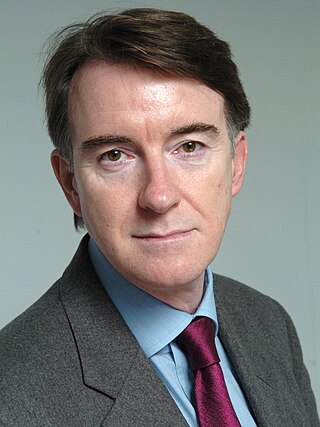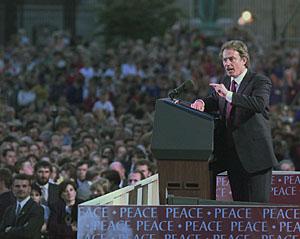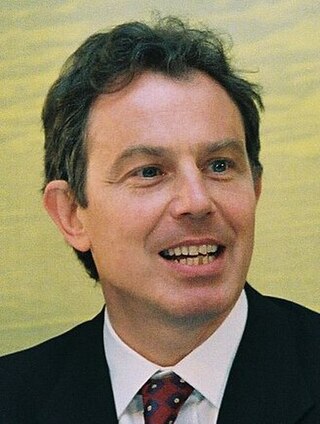Related Research Articles

New Labour is the political philosophy that dominated the history of the British Labour Party from the mid- to late 1990s until 2010 under the leadership of Tony Blair and Gordon Brown. The term originated in a conference slogan first used by the party in 1994, later seen in a draft manifesto which was published in 1996 and titled New Labour, New Life for Britain. It was presented as the brand of a newly reformed party that had altered the old Clause IV and instead endorsed market economics. The branding was extensively used while the party was in government between 1997 and 2010. New Labour was influenced by the political thinking of Anthony Crosland and the leadership of Blair and Brown as well as Peter Mandelson and Alastair Campbell's media campaigning. The political philosophy of New Labour was influenced by the party's development of Anthony Giddens' Third Way which attempted to provide a synthesis between capitalism and socialism. The party emphasised the importance of social justice, rather than equality, emphasising the need for equal opportunity and believed in the use of markets to deliver economic efficiency and social justice.

Peter Benjamin Mandelson, Baron Mandelson, is a British Labour Party politician who served as First Secretary of State from 2009 to 2010. He was President of the Board of Trade in 1998 and from 2008 to 2010. He is the president of international think tank Policy Network, honorary president of the Great Britain–China Centre, and chairman of strategic advisory firm Global Counsel. Mandelson is often referred to as a Blairite.

Stephen John Byers is a British Labour Party politician who was the Member of Parliament (MP) for Wallsend between 1992 and 1997, and North Tyneside from 1997 to 2010. He served in the Cabinet from 1998 to 2002, and was implicated in the MP expenses scandal and retired from politics in 2010.

Charles Leslie Falconer, Baron Falconer of Thoroton, is a British Labour politician, peer and barrister who served as Lord Chancellor and Secretary of State for Justice under Prime Minister Tony Blair from 2003 to 2007.

In British politics, Blairism is the political ideology of Tony Blair, the former leader of the Labour Party and Prime Minister between 1997 and 2007, and those that support him, known as Blairites. It entered the New Penguin English Dictionary in 2000. Elements of the ideology include investment in public services, expansionary efforts in education to encourage social mobility, and increased actions in terms of mass surveillance alongside a ramping up of law enforcement powers, both of these latter changes advocated in the context of fighting organized crime and terrorism. Blairites have additionally been known for their contrast with the traditional support for socialism by those believing in left-wing politics, with Blair himself and others speaking out against the nationalisation of major industries and against also heavy regulations of business operations. On foreign policy, Blairism is supportive of close relations with the United States and liberal interventionism, including advocacy for both the Iraq war and the War in Afghanistan (2001–2021).
Blankety Blank is a British comedy game show which first aired in 1979. The show is based on the American game show Match Game, with contestants trying to match answers given by celebrity panellists to fill-in-the-blank questions.

Alun Edward Michael is a Welsh Labour and Co-operative retired politician. He served as Secretary of State for Wales from 1998 to 1999 and then as the first First Secretary of Wales and Leader of Welsh Labour from 1999 to 2000. He went on to serve as South Wales Police and Crime Commissioner from 2012 to 2024.

Llewellyn Thomas Smith was a British Labour Party politician.

The National Union of Rail, Maritime and Transport Workers is a British trade union covering the transport sector. Its current President is Alex Gordon and its current General Secretary is Mick Lynch.

John Birt, Baron Birt is a British television executive and businessman. He is a former Director-General (1992–2000) of the BBC.

The 2005 United Kingdom general election was held on Thursday 5 May 2005, to elect 646 members to the House of Commons. The governing Labour Party led by the prime minister Tony Blair won its third consecutive victory, with Blair becoming the second Labour leader after Harold Wilson to form three majority governments. However, its majority fell to 66 seats; the majority it won four years earlier had been of 167 seats. The UK media interpreted the results as an indicator of a breakdown in trust in the government, and especially in Blair.

Sir Anthony Charles Lynton Blair is a British politician who served as Prime Minister of the United Kingdom from 1997 to 2007 and Leader of the Labour Party from 1994 to 2007. He was Leader of the Opposition from 1994 to 1997 and held various shadow cabinet posts from 1987 to 1994. Blair was Member of Parliament (MP) for Sedgefield from 1983 to 2007, and was special envoy of the Quartet on the Middle East from 2007 to 2015. He is the second-longest-serving prime minister in post-war British history after Margaret Thatcher, the longest-serving Labour politician to have held the office, and the first and only person to date to lead the party to three consecutive general election victories.

The Deal is a 2003 British television film directed by Stephen Frears from a script by Peter Morgan, based in part upon The Rivals by James Naughtie. The film depicts the Blair–Brown deal, a well-documented pact that Tony Blair and Gordon Brown made, whereby Brown would not stand in the 1994 Labour Party leadership election, so that Blair could have a clear run at becoming leader of the party and later Prime Minister instead. The film begins in 1983, as Blair and Brown were first elected to Parliament, and ends in 1994 at the Granita restaurant—the location of the supposed agreement—with a brief epilogue following the leadership contest.

Tony Blair's term as the prime minister of the United Kingdom began on 2 May 1997 when he accepted an invitation of Queen Elizabeth II to form a government, succeeding John Major of the Conservative Party, and ended on 27 June 2007 upon his resignation. He was also the Leader of the Labour Party. He and Gordon Brown both extensively used the New Labour branding while in office, which was presented as the brand of a newly reformed party that had altered Clause IV and endorsed market economics. He is the second-longest-serving prime minister in post-war British history after Margaret Thatcher, the longest-serving Labour politician to have held the office, and the first and only person to date to lead the party to three consecutive general election victories.

Filmmaker is a quarterly publication magazine covering issues relating to independent film. The magazine was founded in 1992 by Karol Martesko-Fenster, Scott Macaulay and Holly Willis. The magazine is now published by the IFP, which acts in the independent film community.

The Way We Live Now is a 2001 four-part television adaptation of the Anthony Trollope 1875 novel The Way We Live Now. The serial was first broadcast on the BBC and was directed by David Yates, written by Andrew Davies and produced by Nigel Stafford-Clark. David Suchet starred as Augustus Melmotte, with Shirley Henderson as his daughter Marie, Matthew Macfadyen as Sir Felix Carbury, Cillian Murphy as Paul Montague and Miranda Otto as Mrs Hurtle.
The 2015 Labour Party deputy leadership election was triggered on 8 May 2015 by the resignation of Harriet Harman as Deputy Leader of the Labour Party of the United Kingdom following the party's defeat at the 2015 General Election. Harman, the Deputy Leader of the Labour Party, became Acting Leader following Leader Ed Miliband's resignation. Harman announced on the same day that she would step down as Deputy Leader, with her resignation taking effect when the new Leader and Deputy Leader are elected.
David Richard Evans is a British political official who has served as general secretary of the Labour Party since 25 September 2021, having acted as general secretary since 26 May 2020. He served as an assistant general secretary of the Labour Party from 1999 to 2001. Evans was the regional director of the North West Labour Party from 1995 to 1999 and founded The Campaign Company, a political consultancy.
References
- ↑ Jason Deans, BBC's New Labour drama 'based on fact', The Guardian , 7 November 2002
- ↑ BBC Genome listing — BBC One, Sunday 10 November 2002 (Accessed 20 October 2015)
- ↑ BBC Genome listing — BBC One, Monday 11 November 2002 (Accessed 20 October 2015)
- ↑ Programme Information: The Project, BBC, 2002